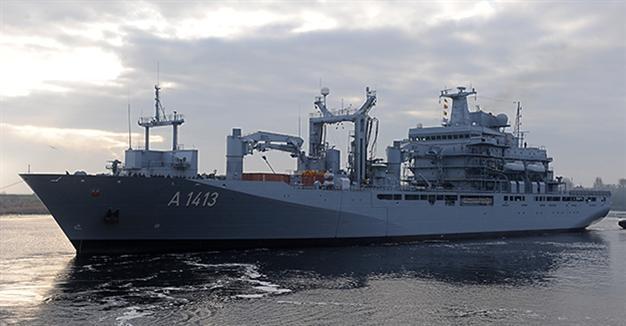Turkey says it is ‘mastermind’ behind NATO’s migrant mission in Aegean
Emine Kart - ANKARA

In this Jan. 14, 2014 file picture the supply ship Bonn leaves the German navy base Wilhelmshaven , Germany. NATO's European commander on Thursday Feb. 11, 2016 ordered three warships to move immediately to the Aegean Sea to help end the deadly smuggling of migrants between Turkey and Greece. AP Photo
NATO’s mission to monitor refugee flows in the Aegean Sea and combat people smugglers is the brainchild of Turkey, Ankara has stressed, rejecting reports that NATO vessels deployed in the Aegean have not yet started operating in Turkish waters because Turkey has not yet given permission.
Despite requests by NATO’s German command, “the Turks refused” this weekend to allow the vessels to enter Turkish waters, Agence France-Presse said in its report posted from Brussels, citing “a diplomatic source.”
“We don’t feel it necessary to respond to the comments, the source of which we do not know and which are obviously fabricated and most probably aimed at creating provocation,” Turkish officials told the Hürriyet Daily News on March 2. “Work is going on to have NATO activity conducted as planned,” the same officials said, speaking on condition of anonymity.
Last week, the Turkish Foreign Ministry announced that the North Atlantic Council (NAC) in Permanent Session approved on Feb. 24 the modalities of activity to be conducted by NATO naval units to support national and international efforts to cut the lines of human trafficking and illegal migration on the Aegean.
“When you take the steps that Turkey has taken for NATO’s activity in the Aegean into consideration, it would be understood how these reports are groundless,” Foreign Ministry Spokesperson Tanju Bilgiç said on March 2, describing claims that Turkey has been blocking the mission as “nonsense.”
“Turkey has acted as the mastermind [of the NATO mission],” Bilgiç said at a press conference, recalling that the NATO decision is a corollary of the proposal made by the defense ministers of Turkey, Germany and Greece at the NATO Defense Ministers’ Meeting held on Feb. 10-11, on the basis of an earlier agreement between Turkish Prime Minister Ahmet Davutoğlu and German Chancellor Angela Merkel.
“Claiming that Turkey has been blocking this is neither reasonable nor consistent. Problems between Turkey and Greece concerning the Aegean are dealt with at a bilateral level. Our goal is to conduct NATO activity without triggering bilateral problems. The NATO Council decision recorded that NATO activities will be executed without harming the national positions of Turkey and Greece. Turkey has no reason to block the NATO Council decision,” Bilgiç said.
Meanwhile, he also announced that Foreign Minister Mevlüt Çavuşoğlu will pay a working visit to Athens on March 4 in order to prepare for a March 8 meeting of the intergovernmental high level cooperation council that will be co-chaired by Prime Minister Ahmet Davutoğlu and his Greek counterpart, Alexis Tsipras, in İzmir.
After late night talks in Brussels, Reuters reported on Feb. 25 that NATO ships already sent to the Aegean, including Turkish and Greek vessels, would pass on reconnaissance to the Turkish and Greek coast guards and to the European Union border agency, Frontex, as well as return any migrants NATO crews had rescued to Turkey.
Problems stopping the migrants stem from the lack of bilateral conformity between Athens and Ankara regarding boundaries of their territorial waters and airspace in the Aegean due to the peculiar geography of the Aegean Sea, where some Greek islands are lined up along Turkey’s western coasts.
AFP cited the same anonymous diplomatic source as saying that Turkish authorities have now asked Rear Admiral Jorg Klein, the German commander of the NATO operation, “to go to Ankara to determine the area where [NATO] might deploy.”
“That is now being discussed between the Germans and the Turks,” the source was quoted as saying by AFP.
Without confirming or denying Klein’s visit, Bilgiç noted that Turkey has been in “constant contact” with NATO officials.
“Setting the modalities is only the first stage of a three-stage process,” Turkish officials told the Hürriyet Daily News last week.
“A technical agreement has been provided so far. The second stage will take place next week [Feb. 29-March 6] and will concern outlining details on how to implement these principles, and the third stage will be implementation,” the same officials said, adding that the second stage involved the “drawing” of maps, which will be attended by military officials from the Turkish Naval Forces.
